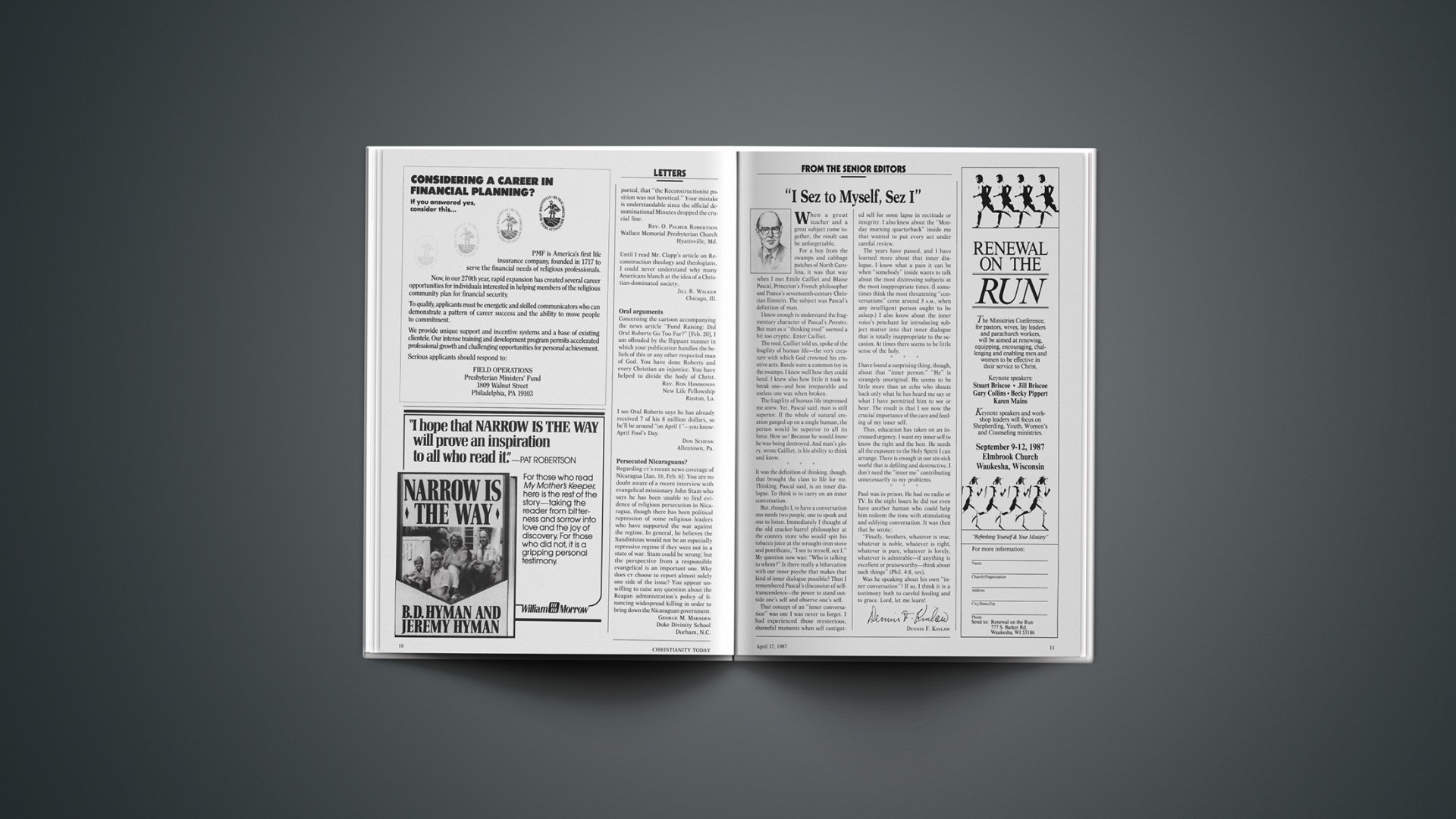When a great teacher and a great subject come together, the result can be unforgettable.
For a boy from the swamps and cabbage patches of North Carolina, it was that way when I met Emile Cailliet and Blaise Pascal, Princeton’s French philosopher and France’s seventeenth-century Christian Einstein. The subject was Pascal’s definition of man.
I knew enough to understand the fragmentary character of Pascal’s Pensées. But man as a “thinking reed” seemed a bit too cryptic. Enter Cailliet.
The reed, Cailliet told us, spoke of the fragility of human life—the very creature with which God crowned his creative acts. Reeds were a common toy in the swamps. I knew well how they could bend. I knew also how little it took to break one—and how irreparable and useless one was when broken.
The fragility of human life impressed me anew. Yet, Pascal said, man is still superior. If the whole of natural creation ganged up on a single human, the person would be superior to all its force. How so? Because he would know he was being destroyed. And man’s glory, wrote Cailliet, is his ability to think and know.
It was the definition of thinking, though, that brought the class to life for me. Thinking, Pascal said, is an inner dialogue. To think is to carry on an inner conversation.
But, thought I, to have a conversation one needs two people, one to speak and one to listen. Immediately I thought of the old cracker-barrel philosopher at the country store who would spit his tobacco juice at the wrought-iron stove and pontificate, “I sez to myself, sez I.” My question now was: “Who is talking to whom?” Is there really a bifurcation with our inner psyche that makes that kind of inner dialogue possible? Then I remembered Pascal’s discussion of self-transcendence—the power to stand outside one’s self and observe one’s self.
That concept of an “inner conversation” was one I was never to forget. I had experienced those mysterious, shameful moments when self castigated self for some lapse in rectitude or integrity. I also knew about the “Monday morning quarterback” inside me that wanted to put every act under careful review.
The years have passed, and I have learned more about that inner dialogue. I know what a pain it can be when “somebody” inside wants to talk about the most distressing subjects at the most inappropriate times. (I sometimes think the most threatening “conversations” come around 3 A.M., when any intelligent person ought to be asleep.) I also know about the inner voice’s penchant for introducing subject matter into that inner dialogue that is totally inappropriate to the occasion. At times there seems to be little sense of the holy.
I have found a surprising thing, though, about that “inner person.” “He” is strangely unoriginal. He seems to be little more than an echo who shouts back only what he has heard me say or what I have permitted him to see or hear. The result is that I see now the crucial importance of the care and feeding of my inner self.
Thus, education has taken on an increased urgency. I want my inner self to know the right and the best. He needs all the exposure to the Holy Spirit I can arrange. There is enough in our sin-sick world that is defiling and destructive. I don’t need the “inner me” contributing unnecessarily to my problems.
Paul was in prison, He had no radio or TV. In the night hours he did not even have another human who could help him redeem the time with stimulating and edifying conversation. It was then that he wrote:
“Finally, brothers, whatever is true, whatever is noble, whatever is right, whatever is pure, whatever is lovely, whatever is admirable—if anything is excellent or praiseworthy—think about such things” (Phil. 4:8, NIV).
Was he speaking about his own “inner conversation”? If so, I think it is a testimony both to careful feeding and to grace. Lord, let me learn!
DENNIS F. KINLAW










